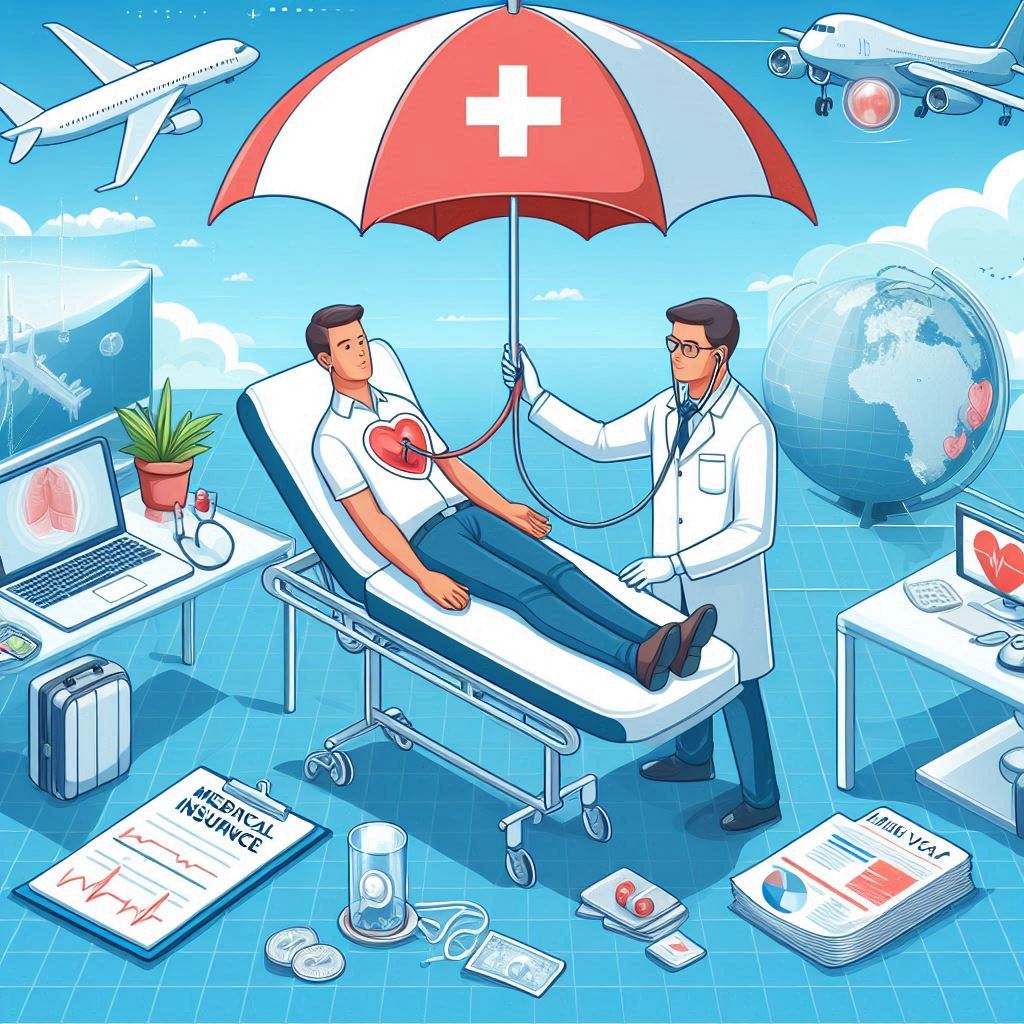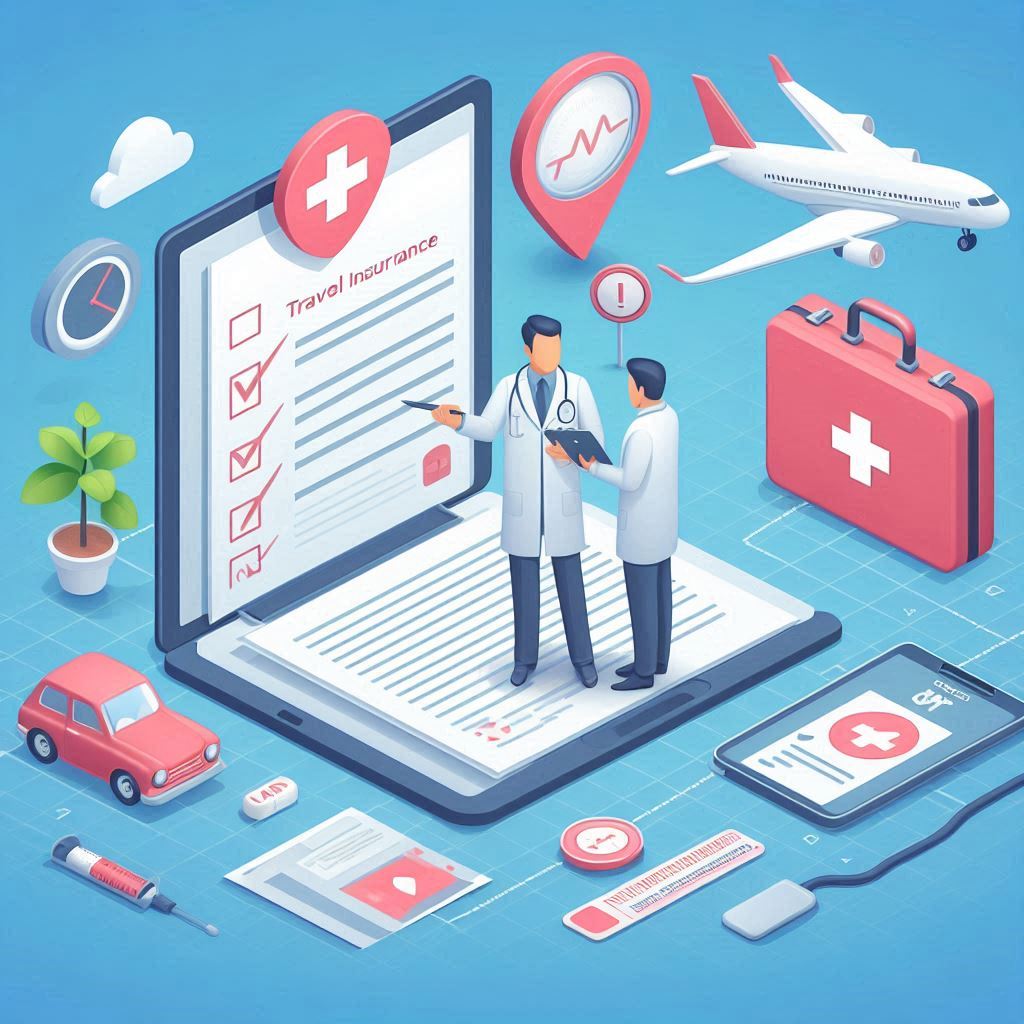What Is Medical Travel Insurance?
Medical travel insurance is your safety net when traveling abroad. It protects you from unexpected medical expenses that can arise during your trip. Imagine needing urgent medical care in a foreign country—without insurance, the costs can be astronomical. This specialized insurance ensures that you’re covered, so you can focus on recovery instead of worrying about financial setbacks.
Definition and Importance of Medical Travel Insurance
Medical travel insurance covers the cost of emergency medical treatment, hospitalization, and related expenses incurred while you’re traveling. It’s especially important when traveling to countries where healthcare costs are significantly higher or where your domestic health insurance doesn’t extend coverage.
What Does Medical Travel Insurance Cover?

Most policies include:
- Emergency medical expenses.
- Repatriation to your home country.
- Coverage for accidents and injuries.
- Costs related to trip cancellation due to medical reasons.
Why Is It Essential for Travelers?
Without it, you risk bearing hefty medical bills. For instance, an emergency evacuation can cost thousands of dollars. Medical travel insurance ensures peace of mind, letting you enjoy your trip without fear of financial ruin.
Types of Medical Travel Insurance Policies
Single-Trip Medical Insurance
Covers one specific trip, making it ideal for occasional travelers. It’s usually cheaper and provides comprehensive coverage for short-term needs.
Multi-Trip Medical Insurance
Perfect for frequent travelers, this policy covers multiple trips within a specified period, such as a year. It saves time and money compared to purchasing individual plans for every trip.
Comprehensive vs. Basic Coverage
Basic policies cover emergency medical care only, while comprehensive plans include trip cancellations, baggage loss, and even personal liability. Choose based on your travel habits and risk tolerance.
Key Benefits of Medical Travel Insurance
Medical travel insurance is more than just a financial safety net; it’s a lifeline that can make or break your travel experience. Understanding its key benefits ensures you make the most of your policy.
Emergency Medical Coverage
Unexpected medical emergencies can happen anytime. Having insurance ensures you’re prepared.
Hospitalization Costs
In the event of severe illness or injury requiring hospitalization, medical travel insurance covers expenses such as admission fees, doctor consultations, surgery, and prescription medications. For example, a hospital stay in the United States can cost over $10,000 per day—an amount that insurance can help offset entirely.
Emergency Evacuation and Repatriation
If a medical emergency occurs in a remote area, you might require air evacuation to the nearest hospital. Additionally, if further treatment is needed, repatriation to your home country may be necessary. These services can cost tens of thousands of dollars, but insurance ensures these costs are covered.
Coverage for Pre-Existing Conditions
Travelers with chronic illnesses or health conditions often worry about coverage. Thankfully, some policies include options for pre-existing conditions.
Conditions Often Covered
Policies may cover chronic conditions like asthma, diabetes, or high blood pressure, provided they are stable and declared in advance.
Limitations and Exclusions
Coverage often comes with conditions, such as stability periods (e.g., no changes in medication for 90 days before travel). Some policies exclude terminal illnesses or conditions requiring regular hospital visits.
Other Valuable Benefits
Medical travel insurance extends beyond emergencies.
Trip Cancellation Due to Medical Reasons
If you need to cancel or cut short your trip due to a medical emergency, the policy reimburses you for non-refundable costs like flight tickets and hotel bookings.
24/7 Assistance Services
Most providers offer 24/7 helplines to assist with locating hospitals, arranging emergency transport, or addressing language barriers when communicating with medical professionals abroad.
Who Needs Medical Travel Insurance?

The short answer? Everyone. However, certain groups benefit even more from tailored coverage.
Frequent Travelers
People who travel often for business or leisure are particularly vulnerable to risks that medical travel insurance addresses.
Business Travelers
Business professionals traveling internationally may face tight schedules, and an unexpected illness could derail critical meetings. Insurance ensures medical issues are handled promptly, minimizing disruptions.
Leisure Travelers
Vacationers often venture into unfamiliar locations where they may be more prone to accidents, illnesses, or foodborne issues. Insurance ensures they enjoy their holidays worry-free.
Travelers with Pre-Existing Medical Conditions
Individuals with known health concerns should never leave home without a policy that addresses their specific needs. Comprehensive plans provide peace of mind by offering tailored coverage.
Adventure Enthusiasts and Sports Travelers
From skiing in the Alps to scuba diving in the Caribbean, adventure sports come with inherent risks. Specialized medical travel insurance covers injuries from high-risk activities, ensuring thrill-seekers can focus on fun without worrying about accidents.
How to Choose the Right Medical Travel Insurance?
Selecting the right plan involves understanding your travel needs and matching them with suitable coverage options.
Assessing Your Needs
A good policy begins with a clear assessment of your travel habits and risks.
Length and Frequency of Travel
Are you going on a one-time trip or traveling multiple times a year? Opt for single-trip insurance if you’re traveling occasionally, or multi-trip insurance for frequent travel.
Destination-Specific Risks
Traveling to remote locations or regions with poor healthcare facilities might require higher coverage limits for evacuation and treatment.
Comparing Policy Features
Not all policies are created equal. Comparing the details helps you find the best match.
Coverage Limits
Ensure the policy offers adequate financial coverage for medical emergencies and evacuation. Some basic plans may have low limits, which might not suffice for serious emergencies.
Add-Ons and Optional Benefits
Consider add-ons like adventure sports coverage, rental car insurance, or coverage for high-value items if your travel plans require it.
Reading the Fine Print
Understanding the terms and conditions can save you from unpleasant surprises.
Common Exclusions
Check for exclusions such as self-inflicted injuries, drug-related incidents, or high-risk activities not covered under standard policies.
Claim Process and Documentation
Review the insurer’s claim process to ensure it’s straightforward. Familiarize yourself with the required documentation to avoid delays in reimbursement.
Common Misconceptions About Medical Travel Insurance
Many travelers skip insurance due to myths and misconceptions. Let’s debunk a few.
“My Regular Health Insurance Covers Travel”
Most domestic health insurance plans do not cover medical expenses abroad. Even if they do, they often exclude services like emergency evacuation or repatriation.
“Medical Travel Insurance Is Too Expensive”
While premiums vary, they are often affordable compared to potential medical costs. Spending $50 on a policy can save you tens of thousands in emergencies.
“I’m Young and Healthy; I Don’t Need It”
Accidents and illnesses don’t discriminate. Even healthy individuals can face unexpected emergencies, making insurance a smart choice for all travelers.
How to File a Claim?
Filing a claim can seem daunting, but following a structured approach makes it manageable.
Step-by-Step Guide to Claim Filing
Collecting Necessary Documentation
Keep all receipts, medical reports, and proof of payment. These documents are crucial for validating your claim.
Contacting the Insurer
Notify your insurer as soon as possible, especially for emergencies requiring immediate assistance. Use their helpline for guidance.
Common Challenges in Claim Processing
Delayed submissions, incomplete documentation, or miscommunication can lead to claim rejection. Be diligent in following procedures.
Tips for a Smooth Claim Process
- Maintain a digital copy of your policy and related documents.
- Keep a record of all communication with the insurer.
Top Providers of Medical Travel Insurance
Choosing a reliable insurer is crucial for securing the best coverage. Here are some of the top providers offering excellent medical travel insurance plans.
Overview of Leading Insurers
Allianz Travel Insurance
Allianz is a global leader in travel insurance, known for its comprehensive policies and excellent customer service. Their plans often include emergency medical coverage, trip cancellation, and 24/7 assistance.
World Nomads
Popular among adventure travelers, World Nomads offers flexible plans tailored for various activities like skiing, scuba diving, and trekking. Their policies cover emergency medical care, evacuation, and even gear protection.
Key Features to Look for in Providers
Reputation and Customer Reviews
A provider’s reputation speaks volumes about its reliability. Look for insurers with high customer ratings, positive reviews, and strong claim processing records.
Policy Flexibility
The best insurers offer customizable policies to suit your needs, such as add-ons for high-risk activities or coverage for extended trips.
Cost of Medical Travel Insurance
Understanding the factors that influence the cost of medical travel insurance can help you find affordable yet comprehensive coverage.
Factors Affecting Premiums
Age of the Traveler
Older travelers typically pay higher premiums due to increased health risks. Many insurers offer specialized plans for seniors with tailored coverage.
Trip Duration and Destination
Longer trips or travel to high-risk areas (e.g., countries with expensive healthcare) often result in higher premiums.
How to Save Money on Medical Travel Insurance
Bundle Discounts
Some insurers offer discounts when you bundle travel insurance with other policies, like home or car insurance.
Early Purchase Benefits
Buying your policy early not only protects against unforeseen cancellations but also often comes with discounts.
Medical Travel Insurance for COVID-19 and Pandemics
The COVID-19 pandemic reshaped travel insurance, making coverage for pandemics a key consideration.
Coverage for COVID-19-Related Expenses
Many insurers now offer policies that cover COVID-19 testing, treatment, and quarantine expenses. Look for plans that include pandemic-related disruptions, such as canceled flights or extended stays.
Post-Pandemic Policy Adjustments
Insurers have adapted policies to address global health crises, offering more comprehensive coverage for emergencies arising from pandemics.
How to Find Policies That Cover Epidemics
When purchasing insurance, check for explicit mention of pandemic or epidemic coverage. Read reviews and ask providers for clarity to ensure you’re fully covered.
Tips for Maximizing Your Medical Travel Insurance

Making the most of your policy requires preparation and understanding.
Carrying Copies of Your Policy
Always carry digital and physical copies of your insurance policy while traveling. These documents are essential for quick reference in emergencies.
Understanding Coverage Limits
Familiarize yourself with the maximum coverage amounts for medical expenses, evacuation, and other benefits. Knowing your limits ensures you can plan accordingly.
Utilizing Assistance Services
Most insurers offer 24/7 support lines. Use these services for guidance on finding medical facilities, arranging transport, or overcoming language barriers.
Conclusion
Medical travel insurance is an indispensable tool for any traveler. It provides financial protection, peace of mind, and access to critical services during emergencies. Whether you’re a business traveler, an adventurer, or someone with specific health needs, investing in the right policy can make all the difference. By understanding your needs, comparing options, and choosing a reliable insurer, you ensure a safe and enjoyable journey.
FAQs
- What is excluded from medical travel insurance?
Most policies exclude self-inflicted injuries, participation in illegal activities, and incidents involving alcohol or drugs. - Is medical travel insurance mandatory for all countries?
No, but some countries, like Schengen Area nations, require proof of travel insurance for visa approval. - Can I buy medical travel insurance after booking my trip?
Yes, but purchasing early ensures coverage for trip cancellations or changes. - What happens if I cancel my trip due to a medical emergency?
Comprehensive travel insurance reimburses non-refundable expenses like flights and accommodations. - Does medical travel insurance cover lost or stolen prescriptions?
Yes, many policies cover the cost of replacing lost or stolen medication.
